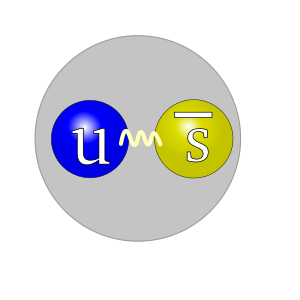Kaon facts for kids
Kaons are tiny particles that are part of the world of subatomic particles. They belong to a group called mesons. Mesons are special because they are made of two even smaller pieces: one quark and one antiquark. Think of quarks as fundamental building blocks of matter.
What makes kaons unique is that they always contain a special type of quark called a strange quark. The other quark in a kaon can be either an up quark or a down quark. Also, one of these two quarks must be an antiquark (the antimatter version of a quark), and the other must be a regular quark. For example, a kaon could be made of an up quark and a strange antiquark. The discovery of kaons was very important because it showed scientists that the strange quark really existed!
What Are Quarks?
Quarks are some of the smallest known particles in the universe. They are the basic building blocks of protons and neutrons, which make up the center of every atom. There are six different "flavors" or types of quarks:
- Up
- Down
- Charm
- Strange
- Top
- Bottom
Each quark also has an antimatter partner called an antiquark. Antiquarks have the opposite electrical charge of their regular quark partners.
Types of Kaons
There are four main types of kaons, but two are simpler to understand: the K+ and the K0. The little plus sign (+) or zero (0) next to the "K" tells us about the particle's electrical charge.
The K+ Kaon
The K+ kaon has a positive electrical charge. It is made of an up quark and a strange antiquark.
- An up quark has a positive charge.
- A strange antiquark has a positive charge (because it's the opposite of a regular strange quark, which has a negative charge).
When these two combine, their charges add up to make a total positive charge for the K+ kaon.
The K0 Kaon
The K0 kaon has no electrical charge, meaning it is neutral. A K0 can be formed in two ways:
- It can be made of a down quark and a strange antiquark.
- Or, it can be made of a down antiquark and a regular strange quark.
In both cases, the charges of the two particles cancel each other out, resulting in a neutral kaon.
Why Kaons Are Important
Kaons helped scientists understand more about the fundamental particles that make up our universe. Their discovery confirmed the existence of the strange quark, which was a big step forward in particle physics. Studying kaons also helps scientists learn about how particles decay and transform into other particles, giving us clues about the basic forces of nature.
See also
 In Spanish: Kaón para niños
In Spanish: Kaón para niños
 | Bayard Rustin |
 | Jeannette Carter |
 | Jeremiah A. Brown |


